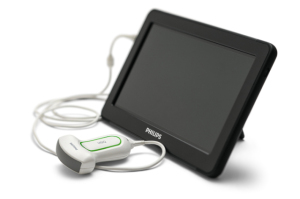by
Lauren Dubinsky, Senior Reporter | July 25, 2014

VISIQ
Courtesy of Royal Philips
Royal Philips announced yesterday that its ultra mobile ultrasound system, VISIQ, received 510(k) clearance from the FDA. It's the first Philips ultrasound system to combine greater mobility, performance and simplicity into a miniaturized solution.
VISIQ consists of a lightweight tablet with a built-in kickstand and it's designed so it can easily be transported to wherever it's needed. It also has a 2.5 hour battery life and built-in Wi-Fi to transfer DICOM data to the hospitals' PACS.
Even though it's a miniaturized system, it's capable of delivering high-quality images because of its smart transducer. Philips took some of the beam-forming capability from their cart-based systems, miniaturized it and put it into the VISIQ transducers.
Traditional transducers on the carts leverage the beam-forming capability in the cart, but VISIQ's transducers take some of the beam-forming capability from the cart and transfer it to the transducers.
"It really is a rather sophisticated piece of equipment that extracts incredible data and image quality in a small package," Sean Gallimore, vice president of global ultrasound marketing at Philips, told DOTmed News.
The company believes that it will increase clinicians' access to diagnostic scans for obstetrical and abdominal applications. "It's so easy to use and it's so mobile that we think more people will use this in a clinical practice, and not tie-up the more expensive equipment, to do routine examinations," said Gallimore.
He added that clinicians who don't currently use ultrasound will find VISIQ valuable because it's easy to use, affordable and useful for different applications.
Other companies, including GE Healthcare, have miniaturized ultrasound systems on the market. Gallimore said that what makes VISIQ unique is its higher image quality and easy user interface.
East Africa was one of the first markets VISIQ was introduced into. Philips is looking to partner with some organizations in Africa so that they can train clinicians, midwives and paraprofessionals in the region.
"We want to get them certified in training and to use this VISIQ system as a way of reducing the number of high-risk pregnancies that occur outside of hospitals," said Gallimore.
VISIQ is also commercially available in India, China, France and Germany.
When Philips was doing their research to design the system, they spoke with many clinicians around the world in order to find out what they need in an ultrasound system. Gallimore said that VISIQ is a "product for the globe."
Back to HCB News
